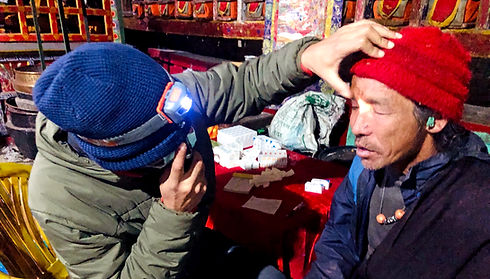Our Projects

Region, where our Projects are based.
PROK KINDERGARTEN
All of our projects are based in Tsum-Nubri Rural Municipality of Gorkha district. The region is an isolated area in the High Himalayas with no road access for vehicles. This valley can be reached either by trekking for 5/6 days through the mountainous terrain from the nearest road, or by chartering a helicopter, which local people can not afford. The difficulty in accessing the village means that bringing goods and supplies is not only expensive but also a complicated process. For example, the options of delivering supplies to the village are through using a porter (which costs $4 per kilogram), a mule (which costs $1 per kilogram), or a helicopter (which costs $6 per kilogram). For example, a $0.5 bar of soap purchased in Kathmandu would cost four times the amount in the village due to the added delivery cost. The option of delivering supplies to the village by charting a large helicopter that can carry up to 2,500 kg normally costs US$5,000. After the Gorkha earthquake (the village is located not very far from the epicenter) the UN had subsidized these flights' costs to allow villagers to bring supplies to rebuild their houses. The subsidy ended in 2018 and charting helicopters has now cost again thousands of dollars.
The laborer cost such as builders and other tradesmen is twice as much as it would be in the cities or easily accessible areas. The reason is that the high mountains have no such skilled workers requiring hiring workers from the low land. These workers would only make the long journey to the high mountains and be away from their families for months on end only if this is reflected in their salary and food is included in the package. Such a high fee for skilled workers in the high mountains is the norm throughout the high Nepali Himalayas. In addition, it is extremely difficult to recruit teachers to take a job in such a remote location, and on average teachers working in such an inaccessible region are being paid up to 40% more than teachers working in urban areas.
The people of Nubri are of Tibetan ancestry and are Buddhists. Nubri has several sacred Buddhist sites and is the home of renowned Buddhist masters such as Mingyur Rinpoche, Tsokneyi Rinpoche, and recently the reincarnation of Tenga Rinpoche. Due to its remote location the villagers, mostly subsistence farmers, and weavers, have struggled to survive. More recently, with the Manaslu Conservation Area attracting tourists, some villagers became porters or guides in the trekking industry. The difficulty in accessing the village meant that development projects have been slow to arrive. Many aid organizations shy away from investing in Nubri due to the high transportation cost and the length of time it takes to reach the villages from the nearest road. This means there are few economic, medical, and educational opportunities with the average income per household being US$340 per year. Due to a lack of infrastructure and medical facilities and as a result of low literacy rates, infant mortality is high.
Nubri is not only remote but it is also a government-restricted area requiring a special permit to do any development or charity work there. The difficulty in accessing this village, the high cost of doing a project, and the added complicated bureaucracy keep most NGOs and INGOs from committing to doing any work in this area. However as our project is both endorsed and supported by Mingyur Rinpoche, Tsoknyi Rinpoche, and village heads, the community has faith and trust in the project, and their full co-operation and participation are assured. These projects are a rare opportunity to help the much-needed people of the Himalayas and are completely in tune with the values, traditions, and culture of the community.








